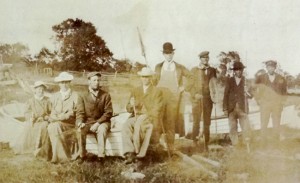Kettle Pointers guided rowdy fishing party

By Laurie Leclair
In 1907, the Indian Agent William Nisbet wrote, “At Kettle Point and Stony Point the principal industry besides farming is acting as boatmen and guides to tourists, and summer resorters.”
Nisbet might well have been talking about two such men who agreed to take a rowdy group fishing on a Canada Day weekend over 100 years ago. A scrapbook entitled Goin’Fishin’ recently unearthed at the Kettle and Stony Point First Nation’s research room provides us with a first-hand account of turn of the century tourism at Kettle Point. “Kirke”, one of the more inspired of the party, made pen and ink sketches of the adventure and chronicled the trip in verse.
It was a spur of the moment adventure:
One day one of the gang got a hunch
Went out instanter en gathered the bunch
Collected the tackle, en bottled the bait
For Kettle Point we took a slow freight
But before they got to Kettle Point, their train stopped nearby:
We landed at Forest, a little old town
Of meager attractions and meager renown
Found there an old pal who was lying in wait
The inner man, to appease, en to freshen the bait
From Forest the party continued by a horse-drawn covered trap to The Elms, a hunting and fishing lodge at the mouth of the Shashawandah Creek run by a Captain George Smith:
At Smith’s we enrolled for sleeping and chuck
Then took to the boats, to each guy his luck
Fred caught the first fish, He shouted in glee!
For fully four inches it measured, said he
The party however, were not seasoned fishermen and the poem relates how Alice, too squeamish to bait the hook herself resorted to flirting with a man named Jake who did it for her. Maggie fell out of the canoe and Fred went in after her. Also, the lake was rough that day and their little white boats churned in the water. It soon proved too much for the author of the poem:
The waves had been rollin’ en tossin’ until
My internal machinery was ready to spill
The jolly good dinner ‘Tis sad to relate
I paid to the fishes, a “Standard Re-Bait”
But the two guides were professionals and managed to ensure that even this party of greenhorns took home a good cache, fishing from the boats or perched atop some of the massive stone kettles along the shore:
When George had got ten, en Bill had got seven
En Fred had got nine en I had got ‘leven
En we all had got hungry right down to the ground
We hiked fer the house, en here’s what we found
From there the party returned to The Elms, an establishment that received its daily supplies of freshly-caught fish from the Kettle and Stony Point community:
There was fish fried in every old way that would please
Wild strawberry shortcake en Pickles en cheese
En olives En cookies Ye Gods! It was right
A regular old belt-buster, we sat to that night
The group ended their day with a bonfire and ghost stories.
But what of the two Anishinabek men who acted as their guides? They appear in one of the photographs, standing alongside the group, next to the little boats. One wears a broad brimmed black hat. He’s small and wiry. His taller, broader colleague sports a sailor’s cap, a vest and a suit jacket. One is named Jeff. With the help of available census data, we learn that there were only two Jeffs on reserve at the time and both from the same family. (The guide may have been Jeff Bressette Jr.)But the other gentleman is more elusive. Was he Jake who baited Alice’s hook? At any rate, on this holiday weekend in 1907, both men had successfully carried out their duties as guides: The tourists enjoyed a day of bountiful fishing, hiking, feasting and spooning and as the evening set in and the campfire died down:
…all sought their rest in the soft arms of Morpheus
Proceeded to imitate the old heathen Orpheus
In base, and falsetto a series of snores
Rose high and triumphant above the wind’s roars
Laurie Leclair is principal of Leclair Historical Research and a treaty researcher for the Union of Ontario Indians.


